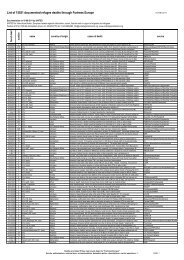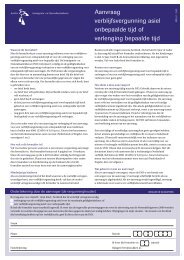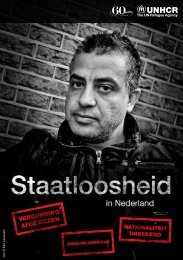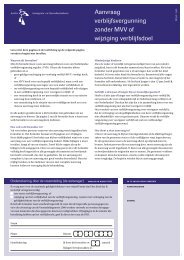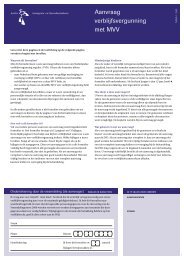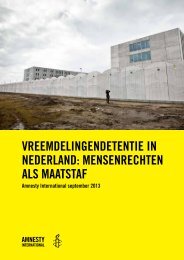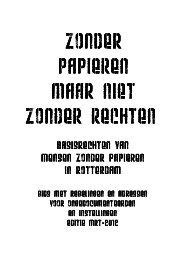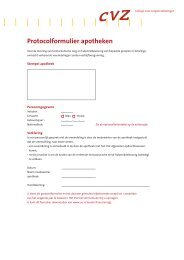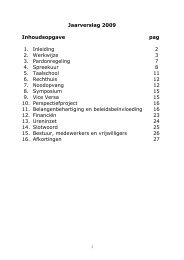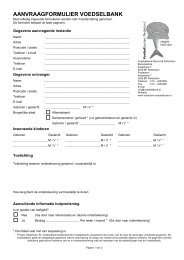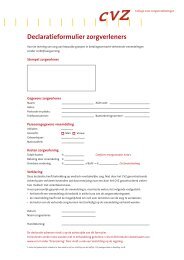Handboek voor begeleiders van vluchtelingen en ... - Stichting ROS
Handboek voor begeleiders van vluchtelingen en ... - Stichting ROS
Handboek voor begeleiders van vluchtelingen en ... - Stichting ROS
You also want an ePaper? Increase the reach of your titles
YUMPU automatically turns print PDFs into web optimized ePapers that Google loves.
and the right to comp<strong>en</strong>sation for persons deprived of their liberty in violation of the<br />
ECHR. The ECHR makes no specific m<strong>en</strong>tion of time limits for administrative<br />
det<strong>en</strong>tion. However, the Court has ruled that continued det<strong>en</strong>tion is not justified<br />
where expulsion or deportation proceedings are not carried out with due dilig<strong>en</strong>ce. 36<br />
Finally, it should be noted that article 2 of Protocol 4 to the ECHR provides free<br />
movem<strong>en</strong>t for those persons lawfully in the territory of a State and the right to choose<br />
one’s resid<strong>en</strong>ce. Since states are bound by law to respect the principle of nonrefoulem<strong>en</strong>t<br />
and all persons have the right to seek asylum protection, it follows that<br />
asylum seekers with a p<strong>en</strong>ding application are lawfully within a country p<strong>en</strong>ding final<br />
adjudication of their claims. 37<br />
• Charter of Fundam<strong>en</strong>tal Rights of the European Union: Under article 45 of the<br />
Charter, freedom of movem<strong>en</strong>t is granted not only to EU citiz<strong>en</strong>s, but may also be granted<br />
to third country nationals legally resid<strong>en</strong>t in the territory of a Member State. National<br />
legislation determines who is legally residing in the territory but refugees are not<br />
considered illegal where there are no grounds for their removal. 38<br />
• Standards of the European Committee for the Prev<strong>en</strong>tion of Torture (CPT<br />
Standards): Article 1 of the European Conv<strong>en</strong>tion for the Prev<strong>en</strong>tion of Torture and<br />
Inhuman or Degrading Treatm<strong>en</strong>t or Punishm<strong>en</strong>t provided for the creation of a committee<br />
to visit places of det<strong>en</strong>tion to <strong>en</strong>sure compliance with its provisions. The Secretariat of<br />
the CPT forms part of the Council of Europe’s Directorate G<strong>en</strong>eral of Human Rights. In<br />
several of its G<strong>en</strong>eral reports, the CPT has described some of the substantive issues it<br />
addresses during its visits to places of det<strong>en</strong>tion. The CPT Standards repres<strong>en</strong>t updated<br />
substantive sections of those reports providing guidance on issues dealing with policy<br />
custody, imprisonm<strong>en</strong>t, training of law <strong>en</strong>forcem<strong>en</strong>t personnel, health care services in<br />
prisons, foreign nationals detained under ali<strong>en</strong>s legislation, involuntary placem<strong>en</strong>t in<br />
psychiatric establishm<strong>en</strong>ts and juv<strong>en</strong>iles and wom<strong>en</strong> deprived of their liberty. The<br />
standards addressing foreigners discuss the following issues: safeguards during det<strong>en</strong>tion,<br />
safeguards during expulsion proceedings and implem<strong>en</strong>tation of expulsion orders.<br />
• EU Council Directive on minimum standards for the reception of asylum seekers<br />
(2003): This directive instructs Member States on reception standards they must put in<br />
place for refugees and asylum seekers in their territories. These standards also apply to<br />
refugees and asylum seekers in det<strong>en</strong>tion.<br />
• Council of Europe Recomm<strong>en</strong>dation Rec (2003) of the Committee of Ministers to<br />
member states on measures of det<strong>en</strong>tion of asylum seekers: This resolution, adopted<br />
by the Council of Europe on April 16, 2003, cautions governm<strong>en</strong>ts to use det<strong>en</strong>tion only<br />
under very narrow circumstances.<br />
• Council of Europe – Tw<strong>en</strong>ty Guidelines on Forced Return: In May 2005, the<br />
Committee of Ministers of the Council of Europe adopted these guidelines, which address<br />
36 Bozano v. France, judgm<strong>en</strong>t of 18 December 1986.<br />
37 See article 31 of the G<strong>en</strong>eva Conv<strong>en</strong>tion (states should not p<strong>en</strong>alize the unlawful <strong>en</strong>try or stay of refugees);<br />
see, also, Comm<strong>en</strong>tary on the Refugee Conv<strong>en</strong>tion 1951, published by the Division of International Protection of<br />
the UNHCR, 1997: “If a refugee is allowed to establish himself in a country and takes up resid<strong>en</strong>ce there, he is<br />
lawfully staying in the country.”<br />
38 Comm<strong>en</strong>tary on the Refugee Conv<strong>en</strong>tion 1951, published by the Division of International Protection of the<br />
UNHCR, 1997: “If a refugee is allowed to establish himself in a country and takes up resid<strong>en</strong>ce there, he is<br />
lawfully staying in the country.”<br />
70




